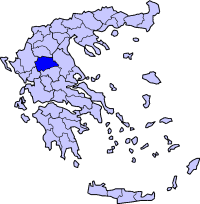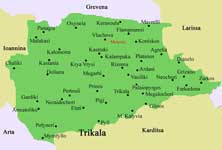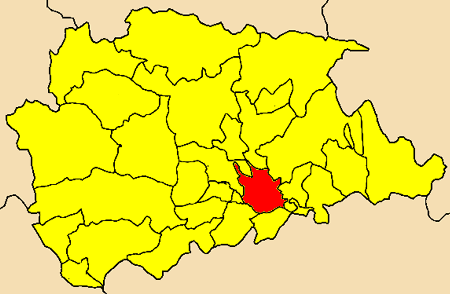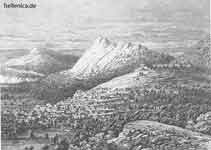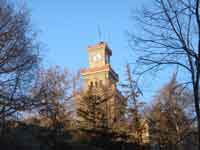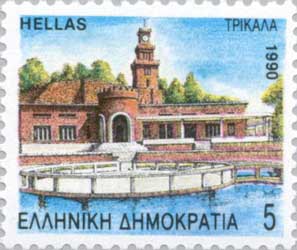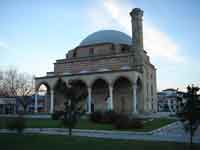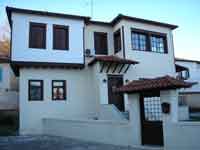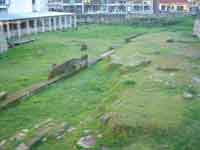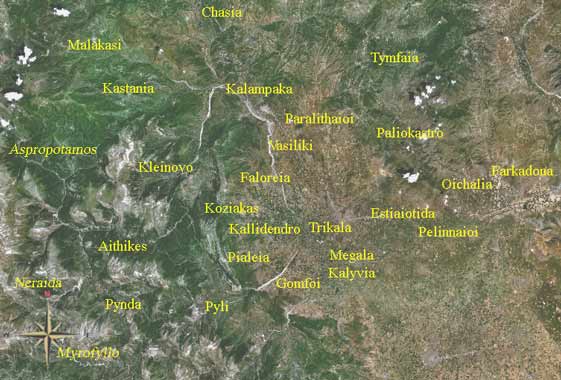.
Trikala (Greek: Τρίκαλα) is a city in northwestern Thessaly, Greece. It is the capital of the Trikala peripheral unit, and is located NW of Athens, NW, of Karditsa, E of Ioannina and Metsovo, S of Grevena, SW of Thessaloniki, and W of Larissa. The city is straddled by the River Litheon, which is a tributary of Pineios river. According to the National Statistical Service, Trikala had 80,900 inhabitants, while the apartment Trikkaion shows population density 133,150 inhabitants per square kilometer.
History
Ruins of the ancient Asclepeion.
View of the clock tower, located at the medieval fortress of the old town (Varousi).
The region of Trikala has been inhabited since prehistoric times and the first signs of life in the cave of Theopetra are reach back to the 49,000 BC approx. They also discovered Neolithic settlements from 6,000 BC in Grand Kefalovriso and other locations.
The city of Trikalas is built on the ancient city Trikka or Trikki, which was founded around the 3rd millennium B.C. and took its name by the nymph Trikki, daughter of Penaeus or according to others daughterof Asopos river. The city was an important center of antiquity, while here lived and acted the Asklipios, that today constitutes emblem of Municipality Trikkaion, which was also king of city. In the region existed in deed one of the most important and ancienter Asklipieia of season. The city is also mentioned in Iliada of Homer, that participated in the war of Troy in the side of Greeks, with thirty boats and heads the doctors sons of Asklipios, Machaona and Podaleirio. The city was also existed as a capital of kingdom at the Mycenaen season and later it constituted center of state of Estaiotidas that occupied roughly the current extent of prefecture Trikala and is described by the geographer Stravona.
In historical times, the city of Trikke and the surrounding area of the river has experienced growth. It fell to the Persians in 480 BC, while ten years later joined the monetary union Thessaly. In 352 BC it was united with the Macedonia of Philip II. The city became a spot of hard battles between Macedonians and Romen, at the invasion of last ones in Greece, while Philippos E' and the son of Perseas were triying to keep the city free, without final success after 168 B.C. it was conquered.
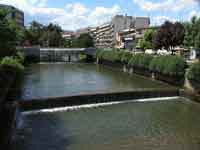
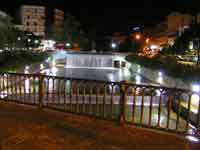
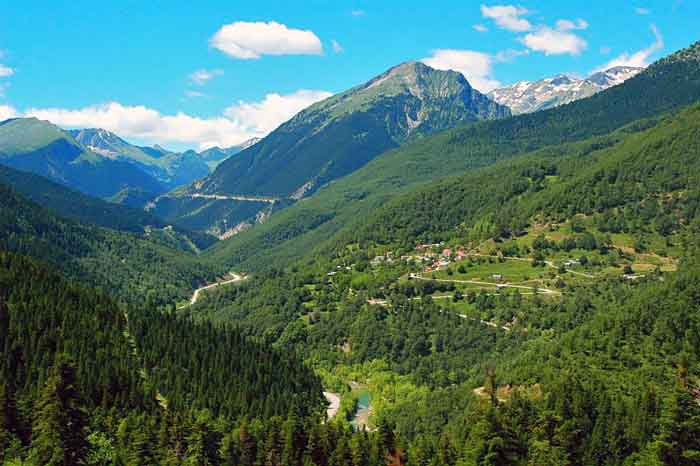
Aspropotamos plane (Acheloos River), Milia village, right the snow covered Mountain Kakarditsa (2429 m), Photo: Thodoris Kliafas.
The first afterwards Christ centuries the city and the region was conquered by many intruders in the Balkan space: Gotthous (396), Ounns (447), Slabs (577), Bulgarians (976-1025), Normen (1081), Catalonians (1309–1311) and from 1204 by Fragks, while for one short space returned in the Byzantine Empire and Despotato of Continent. In the beginning of the millennium the city presents itself for first time with her current name, Trikala, in Alexiada of Anna Komninis. The city was conquered finally by the Ottomans in 1393, and after a extended period of decline becomes important center of cottage industry, with famed products of skin. Also the city constituted an important intellectual center, for a big part of Ottoman domination (1543-1854) it functioned here the Faculty Trikkis (and later Greek Faculty) in which they taught famous schoolteachers of season, as Dionysios the Philosopher.
On 23 August 1881 with the Treaty of Konstantinoupolis( Istanbul), the city passes in Greek sovereignty, as the remainder of Thessaly. It will be again under Turkish sovereignty with the Greek-Turkish war 1897 for roughly one year, up to her final incorporation in Greece (1898). Afterwards Trikala played a fundamental role in the rural mobilizations of beginning of 20th century against the squires and existed the place of foundation of first Agricultural Cooperative in Greece, in 1906.
Municipality
The municipality Trikala was formed at the 2011 local government reform by the merger of the following 8 former municipalities, that became municipal units:[1]
Estiaiotida
Faloreia
Kallidendro
Koziakas
Megala Kalyvia
Paliokastro
Paralithaioi
Trikala
Infrastructure
Trikala is home to the General Hospital of the Trikala Prefecture. The Physical Education and Sport Science department of the University of Thessaly is also located in Trikala, and was founded in 1994, with the first students being admitted in the academic year 1994-1995; it was originally housed in the Matsopoulos Park facility, but moved to the new Karyes campus in July 1999. Trikala has over 20 schools of secondary education, and a modern night technical school also functions in the town.
Since December 2005, the Municipality of Trikala offers its residents free high speed Wireless Internet connection. As of 2007, around 95% of the total area of Trikala has access; this is one of the few European cities to offer such a service for free. Since 2009 tele-medicine is available for its residents, to track serious conditions without the need to visit hospitals.
Sporting teams
The emblem of A.O. Trikala.
A.O. Trikala, a football team that competed in the Greek first division as recently as the year 2000.
AS Trikala 2000 BC, a basketball team that competes in the Greek top division.
International relations
Twin towns — Sister cities
See also: List of twin towns and sister cities in Greece
Trikala is twinned with:
Germany Amberg, Germany
Romania Braşov, Romania
China Chongqing, People's Republic of China
Russia Pyatigorsk, Russia
France Talence, France
United States Tucson, USA
Notable people
Œcumenius (about 990) Bishop of Trikka (now Trikkala)
Evangelos Averoff (1910–1990), politician
Sotirios Hatzigakis (1944) politician
Georgios Kondylis (1879–1936) army officer, Prime Minister of Greece
Sotirios Kyrgiakos (1979) footballer
Vasia Loi (1975) fashion model and television presenter
Dimitris Mitropanos (1948) singer
Christos Papanikolaou (1941) pole vaulter
Efthimios Rentzias (1976) basketball player
Vassilis Tsitsanis (1915–1984) songwriter and singer
Sofia Sakorafa (1957) javelin's thrower
Lampros Choutos (1979) footballer
Periklis Iakovakis (1979) hurdler
Georgios Koltsidas (1970) footballer
Dimitrios Sgouros (1969) pianist
References
^ Kallikratis law Greece Ministry of Interior (Greek)
|
Municipalities and communities of the Trikala Prefecture
Aithikes | Chasia | Estiaiotida | Faloreia | Farkadona | Gomfoi | Kalampaka | Kallidendro | Kastania | Kleinos/Kleinovo | Koziakas | Malakasi | Megala Kalyvia | Oichalia | Paliokastro | Paralithaioi | Pelinnaioi | Pialeia | Pyli | Pynda | Trikala | Tymfaia | Vasiliki |
Greece :
A - B - C - D - E - F - G - H - I - J - K - L - M -
N - O - P - Q - R - S - T - U - V - W - X - Y - Z
| Ancient Greece
Science, Technology , Medicine , Warfare, , Biographies , Life , Cities/Places/Maps , Arts , Literature , Philosophy ,Olympics, Mythology , History , Images Medieval Greece / Byzantine Empire Science, Technology, Arts, , Warfare , Literature, Biographies, Icons, History Modern Greece Cities, Islands, Regions, Fauna/Flora ,Biographies , History , Warfare, Science/Technology, Literature, Music , Arts , Film/Actors , Sport , Fashion --- |
Retrieved from "http://en.wikipedia.org/"
All text is available under the terms of the GNU Free Documentation License


